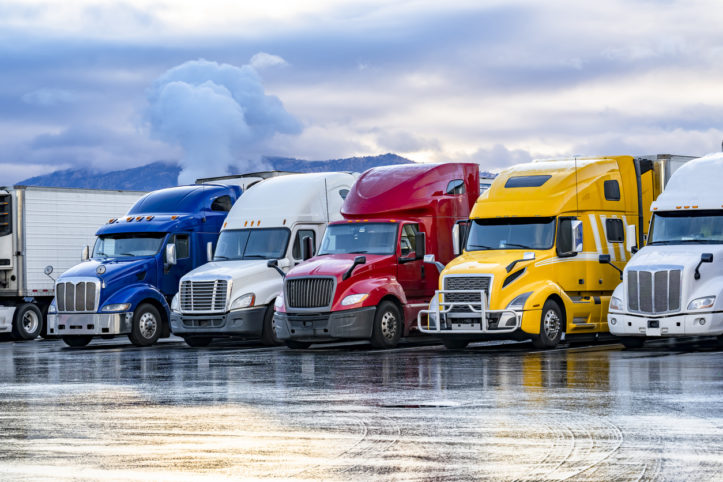
U.S. Opens First Commercial Hydrogen Fuel Station for Big-Rig Trucks at Port of Oakland, Paving the Way for a Cleaner Trucking Future
The U.S. has inaugurated its first commercial hydrogen fuel station dedicated to big-rig trucks at the Port of Oakland, representing an initial step towards a potential clean energy era for long-haul trucking. This modest facility currently supports 30 hydrogen fuel-cell trucks and may herald the beginning of a broader network for refueling such trucks across the country, though its success is not guaranteed.
Hydrogen fuel faces significant challenges, primarily due to its high cost, which can be up to four times higher than traditional gasoline or diesel. The fuel cells, which power the truck’s electric motors, are also quite costly. Additionally, the current methods of producing hydrogen contribute to greenhouse gas emissions, though advancements in green hydrogen are being explored, which, although more costly, could reduce environmental impact. Advocates for hydrogen fuel believe that increased production could eventually lower costs.
By 2036, California will ban the sale of new diesel trucks, mandating that all new trucks have zero tailpipe emissions. Current regulations already require zero emissions for trucks entering maritime ports. The available technologies to meet these standards are battery electric and hydrogen fuel-cell trucks, with a significant number expected to be hydrogen-powered, according to Matt Miyasato, the chief of public policy for hydrogen fuel distributor FirstElement Fuel.
FirstElement operates the largest network of hydrogen fueling stations in the U.S. through its True Zero brand. The Oakland station’s opening ceremony was attended by prominent state officials and was supported by state funds provided through the California Air Resources Board and the California Energy Commission.
Hydrogen fuel offers the potential for cleaner air since it is not derived from fossil fuels and its use in fuel cells results in water vapor emissions only. The federal government is investing $8 billion to stimulate the development of a “hydrogen economy,” with plans to establish hydrogen hubs, including a major hub in California poised to receive $1.2 billion.
Tyson Eckerle, a clean transportation advisor, noted that this funding would support the construction of an additional 60 hydrogen truck stations in California, sufficient to cater to 5,000 trucks and 1,000 buses.
The cost of hydrogen and battery electric trucks is substantially higher than diesel trucks, potentially three times more than a conventional $120,000 diesel truck. However, purchasers can offset most of these initial costs through state and federal subsidies.
In the realm of medium-sized delivery trucks, battery electric vehicles are becoming increasingly prevalent. However, hydrogen trucks may be better suited for long-haul trucking due to their comparable size to diesel engines and quicker refueling capabilities, unlike battery trucks which require lengthy charging times and add significant weight, reducing cargo capacity.
The introduction of hydrogen fuel stations and the gradual shift towards hydrogen fuel-cell trucks could have several implications for truck accident lawyers in any region that is transitioning to this technology:
1. New Regulatory Landscape: As new technologies like hydrogen fuel-cell trucks become more prevalent, the legal framework and regulations governing their use, maintenance, and safety standards will also evolve. Truck accident lawyers will need to stay informed about these changes to effectively represent their clients.
2. Liability Issues: The shift to hydrogen trucks could lead to new types of liability issues. For example, if a hydrogen truck is involved in an accident, questions may arise about the safety of the hydrogen fuel cells, the adequacy of the truck’s design to safely store and use hydrogen, or the proper functioning of the fueling stations. This would require lawyers to develop expertise in new technical areas.
3. Accident Reconstruction: Understanding the mechanics and behavior of hydrogen trucks in accidents will be crucial. Lawyers might need to work closely with experts who specialize in hydrogen technology to accurately reconstruct accidents and understand the dynamics involved.
4. Environmental Claims: Since hydrogen fuel-cell trucks emit only water vapor, they’re considered environmentally friendly. However, if an accident leads to a hydrogen leak, there might be concerns about the potential impact, even though hydrogen is non-toxic. The legal implications of such incidents, though likely less severe than those involving diesel fuel spills, would still need to be navigated.
5. Insurance Adjustments: As the trucking industry adopts new technologies, insurance policies and claims might also evolve. Lawyers will need to understand how insurance coverage for hydrogen trucks differs from diesel trucks, particularly regarding premiums, liabilities, and coverage for new types of risks.
6. Market Opportunities: As the market adjusts to these new technologies, there might be a temporary increase in litigation due to unfamiliarity with the technology or increased accidents during the transition period. This could create new opportunities for truck accident lawyers.
Truck accident lawyers, such as a Hemet truck accident lawyer, will need to adapt to these changes by acquiring new knowledge and possibly collaborating more extensively with technical experts to effectively serve their clients in a new era of trucking technology.


